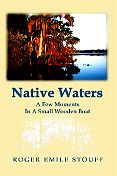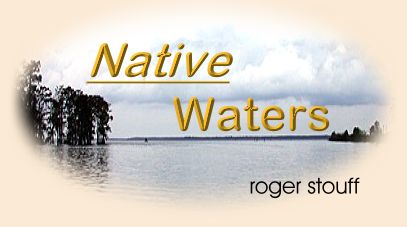|
I made the decision late Sunday that we didn't need to run.
As an only child, I am responsible for my 78-year-old
mother too, and base many such decisions on those
circumstances. But no, the path of Hurricane Katrina
was extremely rigid, the trough coming from the west
had stalled over and to the east of us. I would wake
all night every couple of hours to be sure, but I didn't
believe we were in danger. Of course, we were not.
Monday we got some pretty stiff winds in the 40-60 mph
range and some rain. We even published a newspaper that
day. By then, of course, we knew where Katrina had gone
but there wasn't much news coming out of the impact area.
Like the rest of the nation when the news did start
coming we were appalled. I had my girlfriend and her
family nearby, evacuees from the tremendous swath of
Katrina's path, a wake that stretched from Houma,
Louisiana to Mobile, Alabama. There were half a dozen
more family members I had not heard a word from. I
would not learn they were safe until nearly the end
of the week.
The evacuees started rolling in Sunday, and by Friday
there were thousands in my county, St. Mary Parish. As
always, the people here snapped into action to make them
welcome, comfortable and taken care of. Police were doing
warrants checks on all who entered shelters. Two people
were in fact told to keep moving based on those checks.
We were taking no chances. Baggage was checked. You cannot
be too safe, but I am proud to say that if we only sent
two people on their way out of thousands, we have done good.
The horror of what unfolded in the New Orleans area
cannot be equaled. Yet we keep hearing people saying
they never thought they'd see such a thing in their
lifetimes, and I am left to marvel at how easily we
humans imitate the ostrich, sticking our heads in
the sand. Since at least 1965, when Hurricane Betsy
flooded the city, we have been painfully aware of the
vulnerability of that national treasure, New Orleans.
But when New Orleans was founded by Sieur de Bienville
in 1718, his engineers strongly advised against building
a city there. New Orleans has lived on the precipice of
danger and disaster for nearly 300 years.
It's all about that mightiest of rivers, the Mississippi.
Perhaps the most important economic, cultural and strategic
point on the entire continent, the city's position at the
mouth of the Mississippi River makes New Orleans what it
is. That precarious bargain with nature, a vow sometimes
broken on both sides, has led to New Orleans' unique culture.
People living on the brink of disaster foster and nurture a
love for life, for hard work and hard play. New Orleans
epitomizes that manifestation.
Can New Orleans be rebuilt? Should it be rebuilt? While
people were still dying on rooftops and in attics the
debate began. It's really not a question worth debating:
New Orleans will be rebuilt, it will rebuild itself no
matter how much senators and congressmen and presidents
and pundits wring their hands over it. The unknowns remain
how it will be rebuilt, and where. The massive oil conduits
at Port Fourchon, the incredible capabilities and value of
the Port of New Orleans are not going anywhere, and there
will always be a need for a support system nearby. It's
doubtful that the feds will allow building in "the bowl"
again, and even if they do, insurance companies will never
write another policy.
What has come out of all this, then, that will be most
debated in the future? I believe and I hope and pray that
it will be the vulnerability. That a Category 4/5 storm
struck New Orleans and the nation will feel the shock
waves for months or years to come.
That should bring in the next important debates: Restoring
the barrier islands, the buffer zones of marsh, the sediment
flow of the Mississippi. It's all about the river, remember?
And then that discussion should spread out across the entire
gulf coast, and we should finally, as a nation FINALLY,
understand what coastal loss means. Never mind New Orleans'
position in "the bowl." The northbank cities were not in "the
bowl" and neither was Biloxi. Our coast has to be protected
for benefit of the entire nation.
One more thing. Please give all of us Louisianans a break.
When Hurricane Ivan ripped across Florida, we didn't sit
back shaking out heads and criticizing that people should
know better than to live there, that they should have had
the sense to get out, that my tax dollars are now going to
have to bail Florida out again. When Mt. St. Helens blew,
we didn't wave our fingers in reproach for the choice people
made in living there. When earthquakes hit Los Angeles, we
don't grunt and say, "I told you so." Please stop kicking
us while we're down. We've been kicked enough for now.
And don't forget, America: You have needed us for all
these decades. You needed us to take care of the oil
going to your refineries, the grains you sold overseas,
the imports we brought into the port and you bought at
Starbucks or Saks Fifth Avenue. We've been here, making
our bargain with the river, breaking it and having it
broken, for 300 years. We've been here, and today all
Louisianans are New Orleanians, and today we're all in
this together. We don't want it to be us versus the rest
of the country. New Orleans was more than Mardi Gras and
Jackson Square, luscious aromas from great stainless steel
cooking pots, French Quarter musicians and the Superdome.
New Orleans existed because American needed it to exist.
Now we need your support and compassion and help to show
that it was worth the gamble. Lots of us lost that wager
and paid the debt with our homes, jobs, and in thousands
of cases our lives. ~ Roger
 It's out! And available now! You can be one of the
first to own a copy of Roger's book. Native Waters: A
Few Moments in a Small Wooden Boat
It's out! And available now! You can be one of the
first to own a copy of Roger's book. Native Waters: A
Few Moments in a Small Wooden Boat
Order it now from
www.iuniverse.com, Amazon.com,
or Barnes & Noble.com.
Roger will also be giving away three autographed copies to
readers. Stay tuned, for an announcement on the Bulletin
Board on that soon.
|


 It's out! And available now! You can be one of the
first to own a copy of Roger's book. Native Waters: A
Few Moments in a Small Wooden Boat
It's out! And available now! You can be one of the
first to own a copy of Roger's book. Native Waters: A
Few Moments in a Small Wooden Boat